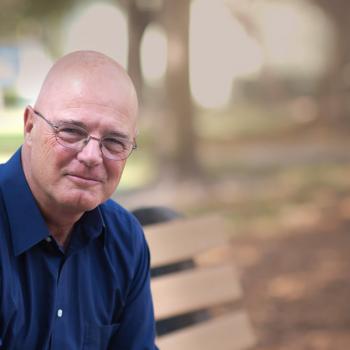Editor’s Note: This article is part of the symposium, “What Is Progressive Christianity?” presented by the newly launched Patheos Progressive Christian Portaland in partnership with the Wild Goose Festival (June 23-26). Like us on Facebookto receive today’s best commentary on Progressive Christianity.
I grew up Fundamentalist. Whatever criticisms you might offer of people from my tribe, at least this could be said of us: we knew our place in the universe. We were in a cosmic battle between God’s forces of light and Satan’s forces of darkness. We were knights of the gospel, warriors for truth, fighters for doctrinal fundamentals and personal purity.
And our nemesis—on the side of darkness, the devil, damnation, and delusion—were the liberals. I’m not surprised that many conservatives still see the world in the same binary ways they did in the 1950s. Dualistic seeing becomes a deeply ingrained habit, so that anything that isn’t conservative (“like us”) is, by default, liberal. That’s why I think those of us who are using the term “progressive Christian” have some extra explaining to do to our conservative brothers and sisters. And even before that, we have some listening to do. We need to understand from them what they think “liberalism” means, and then we have to explain how “progressive” is different.
When I try to re-enter the mindset of my younger years, here’s what I think “liberal” means to my fellow Fundamentalists, Evangelicals, Charismatics, and conservative Catholics:
- Liberalism is lax. Liberals have no passion. They’re sometimes nice. They’re usually moderate. They’re often boring. But they’re never firm and fired up and willing to stand up, be counted, and even suffer for what they believe.
- Liberalism is lazy. Liberals have no backbone. A liberal has never met a capitulation he doesn’t like. That’s why liberals capitulated to Darwin on evolution (we won’t mention Galileo before him), and then on divorce and feminism, and then on homosexuality. Give them some time and they’ll capitulate on atheism and motherhood too. This laziness erodes their identity and leads straight from neo-orthodoxy to nominalism to agnosticism to atheism.
- Liberalism is fuzzy and flimsy. Liberals don’t know what they believe. Everything for them is nuanced and complexified to the point of being incomprehensible and incommunicable. They walk around in a theological fog and if you walk with them, you’ll be in it too.
- Liberalism is proud. Even though they’re lax, lazy, fuzzy, and flimsy, liberals think they’re better than us—more educated, smarter, richer, more high-class, more politically powerful. They’re snobs, always putting us down.
- Liberalism is dying. When you’re lax, lazy, fuzzy, flimsy, and proud, what motivation do you have to evangelize, to expand, to create, to celebrate? Without that motivation, liberals just sit back on their institutional assets and look down on the rest of us—who are passionately committed, energetically expanding, clear on our essential beliefs and mission, and humble enough to work with common people with their messy problems.
Now my liberal friends might point out the flaws in this diagnosis, and they might defend liberalism as being far better than these crude conservative stereotypes. But however justified their self-defense might be, it will only lead to a fruitless argument. That’s why I think it’s far better to forego that argument and instead to prove—in actions first, then in words—that to be a progressive Christian means more than being lax, lazy, fuzzy, flimsy, proud, and dying.
In fact, the progressive Christians I know are highly committed, not lax. True, they don’t measure fidelity in terms of “the five fundamentals of the faith,” but they do take two fundamentals very seriously: “love God and love your neighbor.” And it gets even more interesting when they extend “neighbor” to stranger, outsider, outcast, alien, and enemy. True, they aren’t strict when it comes to drinking a beer or using some colorful vocabulary, but they can be downright puritanical when it comes to recycling and advocating for the environment. Talk to them about equal human rights for Palestinians or LGBTQ folks, or engage them on global poverty and pre-emptive war, and you’ll see real passion.
And although they aren’t rigid doctrinally, they aren’t lazy either. They’re still seeking for meaningful ways to express their faith, and when they find those ways, I think you’ll see a lot more passionate progressive Christians rediscovering “the E-word”—Evangelism. No, it won’t be, “Be a progressive Christian or you’ll burn in hell forever.” It will be more like, “Let’s join God in the healing and liberation of God’s community of creation.” It will be, “I’m part of a faith community that’s learning to live in the way of Jesus. You’re welcome to be part of our journey together.” Or “Why waste your life selfishly pursuing money and power and pleasure when you can join God in the healing of the world?”
When it comes to fuzziness and flimsiness, the progressive Christians I know are making great strides beyond old liberalism. What initially seemed like a morass of complexity—the quest(s) for the historical Jesus, biblical criticism, revisioning the Bible’s inspiration and authority—is turning out to be highly productive. The scholarly process just needed some time to mature. As a result, Progressive Christians aren’t disregarding the Bible; they’re studying it even more diligently than their conservative counterparts, and they’re producing sparkling, challenging, inspiring theologies rooted in the Bible. Fueled by this renewed biblical engagement, they aren’t simply functioning as the religious chaplains of the Democratic party (as their counterparts have often been for the Republican party); they’re articulating a vital political theology and a vigorous theological politics that challenges everybody to seek the common good.
Nor are the Progressive Christians I know proud. If they come from conservative backgrounds as I do, they’ve been beat up pretty bad on their way out and so they’re not interested in doing unto others as they have been done unto. And if they come from liberal backgrounds, they’ve seen the bankruptcy of certain forms of institutional, compromised, culturally accommodated faith. They’re not proud of where they are; they’re excited about where they’re going.
And as for dying, I guess only time will tell. It is a moment of opportunity for Progressive Christianity, I’d say. My sense is that Evangelicalism is in a contraction process, playing to its right wing much the way the Republican party is. And Catholicism seems to be doing something similar, working for a “smaller, purer church” in which less diversity of thought and practice are permitted (at least in the short run; I know that Catholics are masters of the long view). And the historic black churches are often (not always) stuck with two unacceptable options—nostalgia for the Civil Rights era or wholesale sell-out to the Prosperity Gospel.
The Latino and Asian churches have exceptional vitality, but are often (not always) caught in the immigrants’ dilemmas: where is the line that separates our ethnic identity from our faith identity, and what will happen as future generations assimilate more comfortably into mainstream American culture? And mainline Protestant churches are—perhaps for the reasons Evangelicals claim, but I think for other reasons—aging and dying (or wrinkling and shrinking, as they sometimes say). Spreadsheets tell them that their future must be different from their past and present.
All that’s to say that the right kind of Progressive Christian movement could welcome thousands and thousands of Christians who don’t want to contract into more rigid conservatism, live in nostalgia, play the Prosperity Gospel game, keep sinking institutional ships afloat, and so on. But that will only happen if Progressive Christians can make it clear they aren’t simply yesterday’s warmed-over liberal Christians with a new label.
Perhaps the most promising possibility lies with the thousands of SBNRs (spiritual but not religious) who are waiting for something very much like Progressive Christianity to emerge and get down to business. By “business,” I mean the sacred endeavor of loving God and neighbor, stranger, alien, outsider, outcast, and enemy. I mean the work of healing our broken world, the vocation of doing justice, loving kindness, and walking humbly with God. I mean the spiritual work of forming Christ-like people, and the social enterprise of seeking the common good, beginning with the last, the least, and the lost. Moving forward, little by little, in the robust organic process of God’s will being done on earth as it is in heaven—that’s the progress that Progressive Christianity is about.











